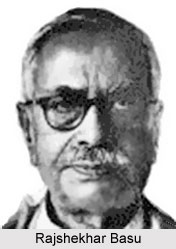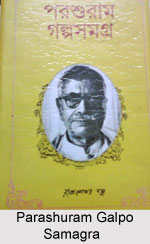 Rajshekhar Basu, also known as Parashuram, was born in the year 1880, on the 16th of March. He was a famed Bengali lexicographer, chemist and writer. His short stories which mainly included satires and comic series, is believed to be some of the most notable literary creations in Bengali literature. Thereafter, Parashuram attained fame as a great Bengali humorist.
Rajshekhar Basu, also known as Parashuram, was born in the year 1880, on the 16th of March. He was a famed Bengali lexicographer, chemist and writer. His short stories which mainly included satires and comic series, is believed to be some of the most notable literary creations in Bengali literature. Thereafter, Parashuram attained fame as a great Bengali humorist.
Early Life of Rajshekhar Basu
Rajshekhar Basu was born in the district of Bardhaman, West Bengal in the residence of his maternal uncle. His parents were Lakshmimani Devi and Chandrasekhar and he was the sixth child of this couple. Rajshekhar spent most of his childhood in the Darbhanga area of the state of Bihar and started learning Hindi as his first language. He harboured an interest for the subject of Science. His elder brother who was known as Shashishekhar, later penned down that Rajsheskhar used to preserve a laboratory at his residence when he was quite young. He made attempts at forecasting the daily weather by observing readings on a barometer which was hung in his room, on the wall and he composed prescriptions of drugs for the members of his family whenever they fell ill. Much later, Parashuram would also venture to the Temple Medical School to examine and dissect corpses.
Rajshekhar Basu went to the Patna city to pursue F.A. degree, where he came into contact with numerous Bengali students. It was at this point of time that he started realizing the beauty of the Bengali literature. After his schooling, Basu finished his M.A. and B.A. degrees in the field of Chemistry, from the Presidency College. He had come to Kolkata for the purpose of achieving both these degrees. He had completed a degree course in the subject of law too, though he was present in court for a minimal period of three days, following which he preferred to quit this profession. Instead, he decided to study science.
Basu is said to have met Acharya Prafulla Chandra Roy, who had initiated a new company called Bengal Chemicals & Pharmaceuticals. Basu then became a part of this company in the year 1903, where he was soon promoted to a high rank, that of a manager.
 Works of Rajshekhar Basu
Works of Rajshekhar Basu
In the 1920s, Rajshekhar Basu started his career in the field of writing, after adopting a pen name of `Parashuram`. He used to contribute humorous literary works for a monthly magazine. `Gaddalika`, which was his very first book of stories, was published in the year 1924. This book was greatly admired by several talented writers, which included the likes of the nobel laureate Rabindranath Tagore. `Chalantika`, a dictionary in the Bengali language was published in 1937 and was one of his most famous creations.
Chalantika was believed to be Basu`s first attempts to modify the Bengali orthography. After its publication, Calcutta University decided to formulate a series of guidelines which governed the spelling of all the Bengali words. Chalantika was immensely popular and still is very much in demand even today. He took active participation as a member of the National Council of Education which was established in the year 1903. He also rendered his services for the Bangiya Sahitya Parishad. He extended all his cooperation to revolutionaries who were associated in the movement of the Indian Independence by donating chemicals and money. The chemicals were utilized for manufacturing bombs.
Rajshekhar Basu`s role in the sphere of printing was quite praiseworthy, especially in West Bengal. He worked as an assistant to Sureshchandra Majumdar who was acclaimed for composing `linotype` in Bengali script. `Hanumaner Swapna Ityadi Galpa` was known as the very first book which was completely written in linotype of the Bengali script.
Awards of Rajshekhar Basu
Rajshekhar Basu was awarded the title of `Jagattarini` and `Sarojini` by the Calcutta University in 1940 and 1945 respectively as he enriched the Bengali literature to a great extent. He was also honoured with the award of the D.Litt by Jadavpur University in 1957. The Rabindra Puraskar was awarded to him in the year 1955, for his work of `Krishnakali Ityadi Golpo`. In 1955 as well as 1956, Basu was offered the Padma Bhushan award. Again, in the year 1958, he received the award called `Akademi Puraskar` for his work on `Anandibai Ityadi Galpa`.
Personal Life of Rajshekhar Basu
Rajshekhar Basu got married and possessed a daughter. His son-in-law had passed away abruptly, on account of a terrible illness at a young age. His daughter died on the very same day since he was extremely shocked. In 1942, the wife of Basu died. Basu continued his writings, despite all his personal tragedies.
Rajshekar Basu died on 27th April, 1960, due to a massive second stroke, when was asleep.



















